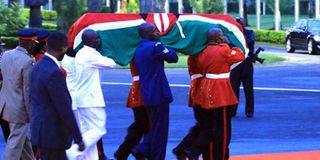Mama Lucy was an asset in war on Aids

Military pall-bearers carry the casket bearing the body of former First Lady Lucy Kibaki at JKIA on May 1, 2016. The former First Lady made clear her enthusiasm to work closely with Aids council, specifically requesting to meet people who were open about their HIV-positive status and to interact with them publicly. PHOTO | JOAN PERERUAN | NATION MEDIA GROUP
What you need to know:
- As Mama Lucy enthusiastically shook hands with officials there, who had gone public about their HIV-positive status, we could see some onlookers turn away their faces, as was common then due to high stigmatisation.
- When the cabinet HIV/Aids committee was formed, one of its instructions was that the war against HIV/Aids must be intensified in the constituencies.
- The first lady made clear her enthusiasm to work closely with Aids council, specifically requesting to meet people who were open about their HIV-positive status and to interact with them publicly.
I was in the crowd that stood waiting at Uhuru Park from early morning to see Mr Mwai Kibaki sworn in as president of Kenya in December 2002.
Little did I know that a few months later, in March 2003, he would appoint me the chairperson of the National Aids Control Council. Soon afterwards, a cabinet committee on HIV/Aids was established, with the president as the chairman. We in the council were delighted that HIV/Aids had been given this high profile.
As it turned out, it was the first lady, Mrs Lucy Kibaki, who worked most closely with the Aids council. Within months of being in State House, on 22 July 2003, Mrs Kibaki launched the Kenya chapter of the Organisation of African First Ladies Against HIV/Aids and gave a very clear message: Kenyans must go for testing to find out their HIV status and those found positive must be supported and not shunned. She declared that her focus would be the rural areas.
The first lady made clear her enthusiasm to work closely with Aids council, specifically requesting to meet people who were open about their HIV-positive status and to interact with them publicly. The council arranged for her to visit the offices of Women Fighting Aids in Kenya.
As Mama Lucy enthusiastically shook hands with officials there, who had gone public about their HIV-positive status, we could see some onlookers turn away their faces, as was common then due to high stigmatisation.
The visit was shown on TV several times and it was after this that we began to see other senior Kenyan government officials acting more at ease around HIV-positive people. Mama Lucy Kibaki helped Kenyans to begin to break the yoke of stigmatisation against our fellow citizens who were HIV-positive.
She also helped to publicise the successes of Kenya in HIV/Aids control.
The first time she did this was at a meeting of the Organisation of African First Ladies Against HIV/Aids in Kigali, Rwanda, in February 2004.
As we entered the hall and she saw how full it was, she motioned to me and whispered, “Do you think I will deliver the Kenya case well?” I assured her that she would do it better than anyone I knew, being the professional teacher that she was.
And true to form, she walked to that podium in style and made the case for Kenya, presenting the areas in which we had made progress.
As is often the case, Mama Lucy’s most important contribution has not been a matter of public knowledge. When the cabinet HIV/Aids committee was formed, one of its instructions was that the war against HIV/Aids must be intensified in the constituencies.
There were constituency Aids control committees but with no secretariats. The council decided that there be a secretariat for each committee staffed by civil servants. Provincial Aids control officers identified individuals for each secretariat.
However, senior officials based in Nairobi would not give their permission for the programme to proceed. As months passed, it was increasingly frustrating as every single day in the fight against HIV/Aids was crucial.
During one of our regular briefing sessions with the First Lady I mentioned this problem. “Some people want to frustrate the president’s decisions,” she said. Taking my hand, she led me right into the president’s office and left me there, saying to Mr Kibaki: “It’s necessary for you to know about this.”
The president called a number of key offices to ask about the delay. Within weeks all constituency committees had their secretariats. And that is when Kenya began to break the stronghold of HIV/Aids. And we owe all this success to Mama Lucy.
Prof Were is the chancellor of Moi University.





